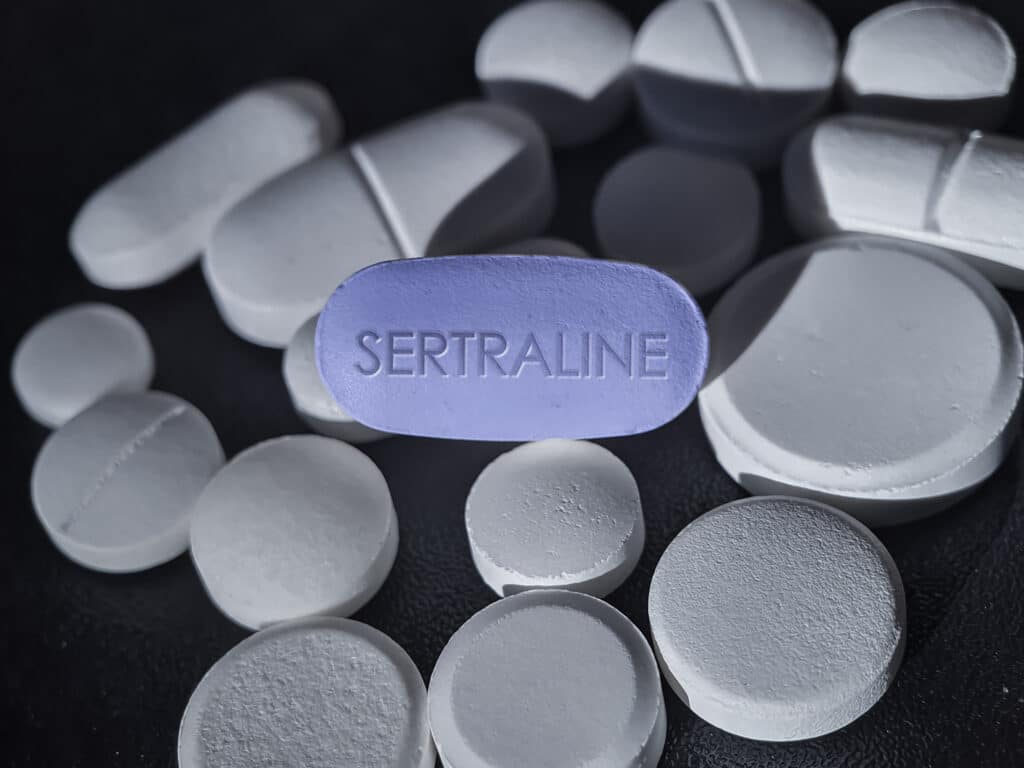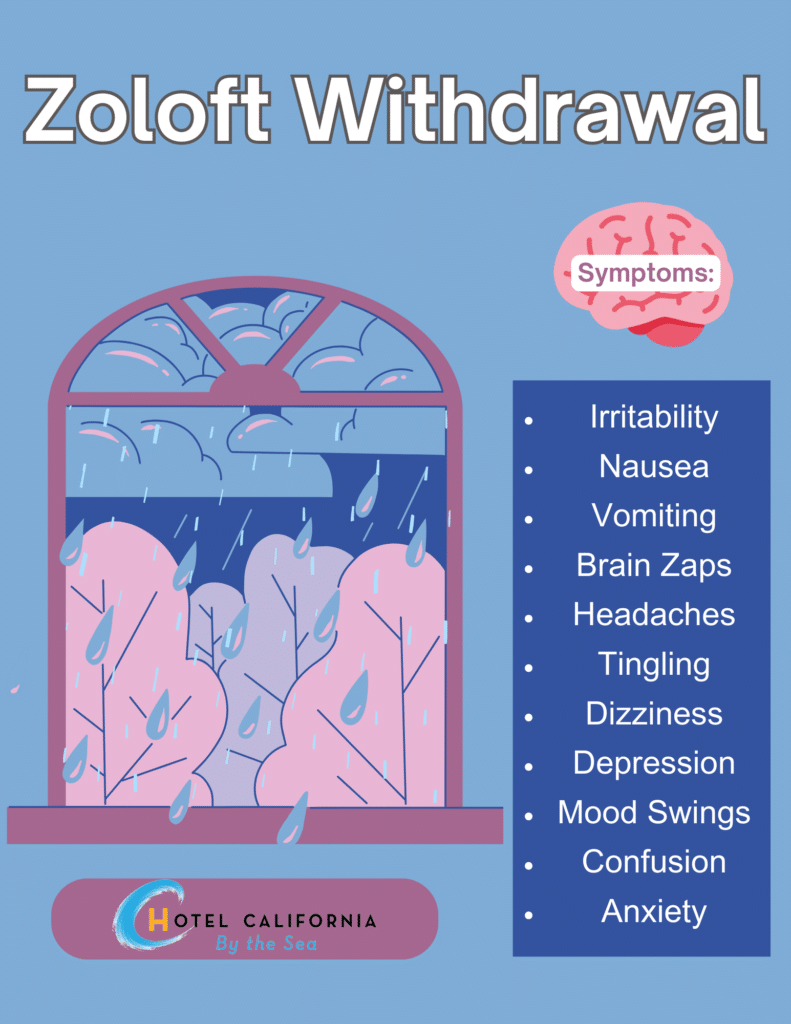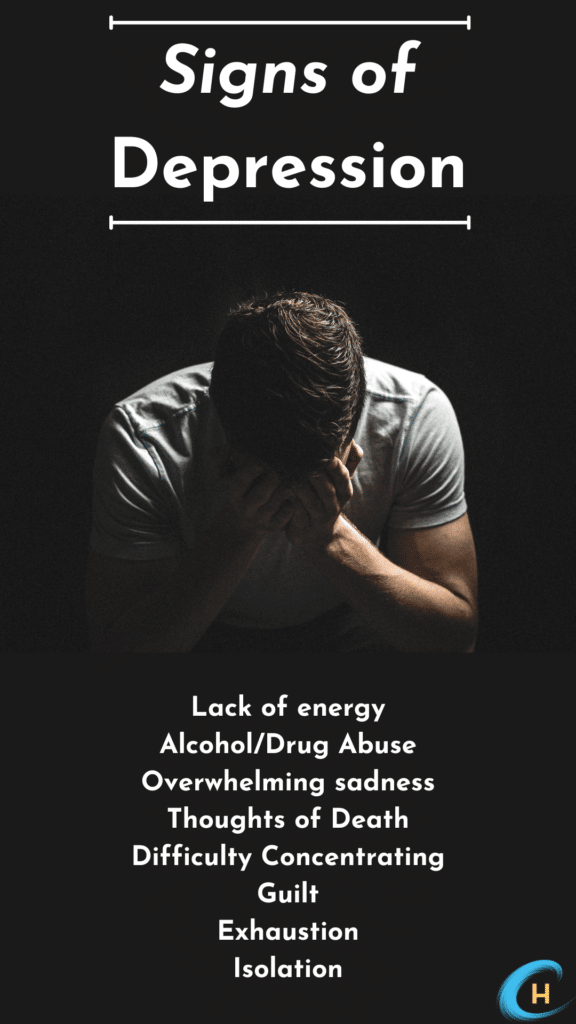Is Zoloft Addictive?
Zoloft is one of the most popular antidepressants in the U.S. The second generation, newer class of antidepressants was developed to be better tolerated than its predecessors. It is known under the generic name Sertraline. The antidepressant is FDA-approved to help alleviate symptoms of depression, obsessive-compulsive disorder, panic disorder, anxiety disorders, posttraumatic stress disorder and premenstrual dysphoric disorder. Zoloft is also often prescribed for off-label uses such as binge eating disorder, body dysmorphic disorder, bulimia nervosa, generalized anxiety disorder and sleep disorders.

Zoloft is a selective serotonin reuptake inhibitor (SSRI), which is a type of medication that stabilizes the amount of serotonin in the brain. Serotonin is a neurotransmitter and hormone that helps to regulate and balance emotions. It also affects stress response, memory, sleep and influences the development of addiction. People who have low levels of serotonin often suffer from depression and other mood-disrupting mental health issues.
Zoloft doesn’t create serotonin. SSRIs work by blocking the brain’s reuptake of serotonin. Normally serotonin is quickly reabsorbed after its release. With Zoloft, once the serotonin is released into the body, the medication blocks it from being reabsorbed so that there is more of the hormone available to use. The serotonin will remain in the synaptic gap between neurons for longer and lead to more of the hormone in the brain. The artificial manipulation of serotonin levels over time has the potential to create a serotonin deficiency and alter normal brain functions.
Is Zoloft Addictive?
Similar to other types of SSRI antidepressants, Zoloft has a potential for misuse, dependence, withdrawal and overdose. Addiction can develop when a user begins to rely on medications to elevate and control their mood. This is also known as psychological dependence.
Zoloft is usually prescribed for long-term use. This is because it can take a few weeks for the medication to take effect and treat symptoms. The drug doesn’t specifically produce a sense of euphoria. But it does produce hypomania. This is a short period of increased mood, excited state and overactive behaviors that in some people, can feel euphoric.

Side Effects and Symptoms of Zoloft Addiction
- Worsening clinical symptoms
- Risk of suicide, suicidal thoughts and ideation
- Nutrient deficiencies
- Chills
- Dizziness and vertigo
- Fatigue and headaches
- Irritability
- Insomnia
- Lack of concentration
- Nausea and vomiting
- Nightmares and vivid dreams
- Tingling sensation of the skin
- Loss of appetite
- Tremors
- Withdrawal – Brain jolts or zaps are odd electrical sensations felt in the brain. It can feel like pins and needles, ringing in the ears, strange tastes or a hypersensitivity to sound.
- Secondary hepatitis – This condition occurs when the elimination of the medication from the body is disrupted by liver impairment
- Akathisia – Causes extreme agitation, unbearable internal and motor restlessness and anxiousness. This condition often comes before extreme psychological symptoms such as aggressive thoughts, suicidal thoughts, behaviors and ideation.

Withdrawal is a common occurrence in people who have become dependent on Zoloft to manage their mood. It can happen within 3-4 days after the last dose. An estimated 56% of people who quit antidepressants experience withdrawal symptoms. When they abruptly stop taking it, a few things can happen. Zoloft withdrawal is a form of SSRI Discontinuation Syndrome. This is a condition that can affect 20% of people who use SSRIs. It can last anywhere from one to two weeks and usually causes the development of rebound symptoms such as worsening depression and anxiety.
A major side effect of Zoloft addiction and overdose is the development of serotonin syndrome. Serotonin syndrome is a severe drug reaction when a prescription drug builds up high levels and excess serotonin in the body. In other words, when a person takes too many SSRIs, it can be lethal. It is a rare condition and can cause symptoms such as fever, chills, and coma.
How long does Zoloft stay in your system?
Zoloft is a long-acting medication. The half-life for Zoloft is about 26 hours on average. In cases where the liver is damaged and unable to process the medication properly, the half-life can extend to 50 hours. It takes about 4-6 weeks for the medication to begin working and in extreme cases, it can take about 12 weeks. Ultimately it takes on average about five and a half days for the medication to be 99% removed from the body.
Patients will begin to see improvement in symptoms of depression and anxiety after a few weeks of use. Sleep improvements and changes in appetite can change during the first month of medication use. Most changes and symptom relief will happen gradually over a period of time.
Check Your Insurance Coverage for FREE
Find out if your insurance covers addiction treatment in minutes. We accept most insurance!
Can you take Sertraline and Adderall?
Depression is one of the most common mental health disorders. And people who suffer from ADHD are especially prone to developing symptoms of depression. In fact, according to the Children and Adults with Attention Deficit/Hyperactivity Disorder (CHADD) organization, one in three people with ADHD believe they have experienced depressive episodes. Because of this Sertraline and Adderall are often prescribed together to treat symptoms of both ADHD and depression.
There are symptoms for both co-occurring mental health disorders that overlap. They are both stimulant prescription medications used to help patients with attention and focus problems. Despite its success in being prescribed simultaneously, the combination of the two drugs can become highly addictive. They are similar in chemical structure and can lead to intense withdrawal symptoms once the drug is stopped. Both medications work by altering the chemical makeup of the brain and affecting serotonin levels in the body. Because of that, there is a much higher risk of developing serotonin syndrome.
Side effects of taking the drugs together include jitteriness, racing thoughts, extreme fatigue and risk of worsening depression and suicidal thoughts and behaviors.
What are the effects of Alcohol and Zoloft?
Depression and alcohol often go hand in hand. Factors that can contribute to depression include brain chemistry imbalance, genetics, life events, negative thought patterns and alcohol. Often alcohol can exacerbate the symptoms of depression. Alcohol is considered a depressant because it disrupts the balance of neurotransmitters in the brain that control emotion, which results in psychological changes in the brain.
Mixing alcohol and antidepressants can enhance the effects of Zoloft. Alcohol can negatively impact how antidepressants work and even make them less effective. Some of the side effects of combining the two substances include nausea, dizziness, tiredness, mood changes, trouble thinking clearly, sleep disturbances and impaired coordination. Users should avoid mixing alcohol with an antidepressant such as Zoloft.
Reach out to Hotel California by the Sea
We specialize in treating addiction and other co-occurring disorders, such as PTSD. Our Admissions specialists are available to walk you through the best options for treating your addiction.
Treatment for Stimulant Use Disorder and Depression
At Hotel California by the Sea, we understand the difficulties of stimulant addiction and the co-occurring mental health conditions that often come with it. We specialize in helping clients overcome all aspects of their substance addiction. We work on targeting the physical, psychological and emotional aspects of addiction. By offering all levels of care including detox, residential and outpatient, clients have options for what treatment will be best for them.
Unique evidence-based treatments such as CBT, DBT and EMDR therapy are utilized as part of a comprehensive treatment plan. Individual and group therapy sessions allow clients to learn and practice coping skills in a safe and stable environment. Hotel California by the Sea is committed to helping clients from all walks of life achieve sobriety and lifelong recovery.
References:
https://www.addictioncenter.com/stimulants/antidepressants/zoloft-addiction-abuse/
https://www.alternativetomeds.com/blog/zoloft-addiction-dependence/
https://www.ncbi.nlm.nih.gov/books/NBK547689/
https://www.forbes.com/health/mind/zoloft/
https://www.verywellmind.com/sertraline-understanding-how-zoloft-works-2671837
https://www.verywellhealth.com/mixing-alcohol-and-zoloft-the-risks-of-drinking-with-ssris-7964628
https://www.health.harvard.edu/newsletter_article/what-are-the-real-risks-of-antidepressants
https://www.verywellmind.com/sertraline-withdrawal-4771948
